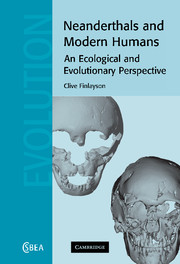Book contents
- Frontmatter
- Contents
- Preface
- Acknowledgements
- 1 Human evolution in the Pleistocene
- 2 Biogeographical patterns
- 3 Human range expansions, contractions and extinctions
- 4 The Modern Human–Neanderthal problem
- 5 Comparative behaviour and ecology of Neanderthals and Modern Humans
- 6 The conditions in Africa and Eurasia during the last glacial cycle
- 7 The Modern Human colonisation and the Neanderthal extinction
- 8 The survival of the weakest
- References
- Index
Preface
Published online by Cambridge University Press: 07 August 2009
- Frontmatter
- Contents
- Preface
- Acknowledgements
- 1 Human evolution in the Pleistocene
- 2 Biogeographical patterns
- 3 Human range expansions, contractions and extinctions
- 4 The Modern Human–Neanderthal problem
- 5 Comparative behaviour and ecology of Neanderthals and Modern Humans
- 6 The conditions in Africa and Eurasia during the last glacial cycle
- 7 The Modern Human colonisation and the Neanderthal extinction
- 8 The survival of the weakest
- References
- Index
Summary
In 1848 a strange skull was discovered in Forbes' Quarry, Gibraltar, close to where I live. A second skull found eight years later in the Neander Valley, near Dusseldorf in Germany, gave a new hominid its name – the Neanderthal. This name, and its relation to an individual that lived close to the edge of its range, led to over a century of perception of the Neanderthals as a brutish people of northern Europe who survived, through thick and thin, the cold of the ‘ice ages’ until they were supplanted by the newly arrived and intelligent Modern Humans.
The image is still one that many regard as close to reality. Yet, paradoxically, the Neanderthals were intelligent people of mild climates. They evolved across the northern shores of the Mediterranean Sea and eastwards towards the Black and Caspian Seas. They ventured north only during mild climatic episodes and the unstable, cold and arid climate of late Pleistocene Europe eventually gave them the blow that sent them on the road to extinction. The Modern Humans hovered in the periphery and took advantage of the situations left vacant by the Neanderthals. This book is an attempt to redress the balance of over a century of misunderstanding.
- Type
- Chapter
- Information
- Neanderthals and Modern HumansAn Ecological and Evolutionary Perspective, pp. ixPublisher: Cambridge University PressPrint publication year: 2004



